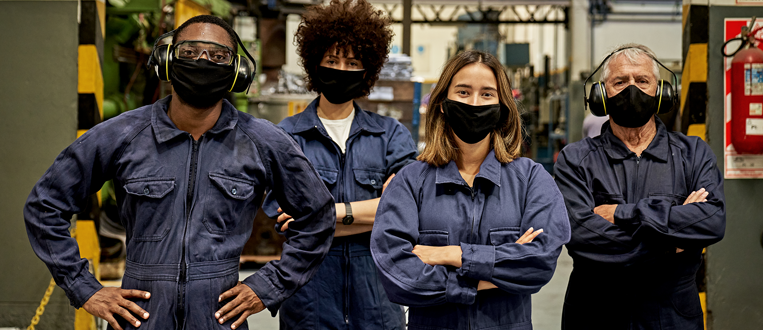Manufacturing Innovation Blog
Powered by the Manufacturing Extension Partnership

This blog is the second in a monthly series brought to you by the new America Works initiative. As a part of the MEP National Network’s goal of supporting the growth of small and medium-sized manufacturing companies, this series focuses on innovative approaches and uncovering the latest trends in manufacturing workforce development.
Craig Garner, profiled recently in a PBS News Hour segment discussing Rhode Island’s focus on retraining workers displaced by the pandemic, is excited about his new job at Yushin, a robotics manufacturer. He may or may not know what Polaris MEP is – even though Rhode Island’s MEP Center played a critical role in creating the training program that landed him his new job, and potentially set him on a whole new career path.
You may not hear their names on the evening news, but MEP Centers like Polaris are actively working “from K to Gray,” a holistic approach to education throughout a person’s life, to develop a more diverse, inclusive advanced manufacturing workforce of the future. The case for improving diversity in every industry is clear: as McKinsey has written extensively, “Companies in the top quartile of gender and ethnic diversity were 25% and 36% more likely to financially outperform those in the bottom quartile, respectively.” Moreover, the pandemic has disproportionately displaced workers of color, and connecting displaced workers like Craig to higher-paying job opportunities in advanced manufacturing is a win for the worker, for the company, for our economy, and for our society overall.
To be clear, diversity takes many forms – race, ability, age, gender, nationality, socioeconomic status, and more – and MEP Centers are offering programs in every area. In fact, America Works is actively tracking the vast array of programs offered by MEP Centers that increase diversity, equity and inclusion (DEI) across the spectrum. For this article, we’ll give some well-deserved shout-outs to Centers that have best-in-class programs in diversifying the American manufacturing workforce.
Engaging Diverse Youth
While STEM programs can be found in schools around the country, MEP Centers are actively introducing young people to careers in advanced manufacturing. Many MEP Centers, like NWIRC (part of Pennsylvania MEP) and Alabama Technology Network (the MEP Center in Alabama), successfully pivoted during the pandemic to offer virtual factory tours during 2020’s Manufacturing Day. Some MEP Centers, like DVIRC (part of Pennsylvania MEP), have partnered with local high schools to create exciting engineering programs; others have launched robust youth apprenticeships, like MAGNET’s (part of Ohio MEP) Early College, Early Career program. The “What’s So Cool About Manufacturing?” video contest, started by the Manufacturers Resource Center (part of Pennsylvania MEP) in 2013 and targeted towards middle schoolers, has now grown to more than a dozen states.
Educating and Training Diverse Adults from Diverse Backgrounds
Around the country, MEP Centers are creating bootcamps and other rapid on-ramps for workers into open jobs. New Hampshire MEP partnered with a wide range of organizations to actively place displaced workers into open manufacturing jobs. Future Fit, an ambitious partnership in Arkansas that includes Arkansas Manufacturing Solutions (the MEP Center in Arkansas), incentivizes holistically supporting all students by reimbursing the community colleges only for those students who successfully complete the 100 hours of training. Amongst Catalyst Connection’s (part of Pennsylvania MEP) robust workforce offerings, the Operation NEXT program offers no-cost training in CNC, maintenance and welding to upskill or reskill workers. And to ensure that new workers are welcomed on the plant floor, Maryland MEP hosted a Critical Manufacturing Strategies webinar that focused specifically on DEI for manufacturing executives.
Communities
MEP Centers are partnering with community-based organizations (CBOs) to provide comprehensive support services that specifically assist workers of color and increase their likelihood of successful participation in workforce development programs. MAGNET in Cleveland, Ohio, has created a Manufacturing Sector Partnership, which then partnered with several nonprofits to launch ACCESS, a training program for returning citizens to connect with manufacturing jobs. And NJMEP has launched the ProAction Education Network, a consortium of nonprofits, government agencies, and schools that actively offers industry-recognized certifications to every interested New Jersey 12th grader, displaced workers, incumbent workers, and more.
As you can see, when it comes to workforce in many communities, the MEP Centers are the real “boots on the ground,” offering manufacturing careers to more youth, adults and communities. Of course, these programs are just a start, and the DEI journey for American manufacturing is still in progress. To accelerate the process, America Works is actively working to forge new partnerships with leading organizations in this area – including The Century Foundation, Urban Manufacturing Alliance, Jobs for the Future, National Fund for Workforce Solutions, and more – with the goal of leveraging that expertise to better inform and grow MEP Center programs. If you know of best-in-class programs or organizations, either within the MEP National NetworkTM or outside it, please mfieldman [at] manufacturingsuccess.org (let us know).
Together we can make real and lasting change in American manufacturing through growing and diversifying our workforce. The goal is clear: an American manufacturing sector that welcomes, supports and retains workers – regardless of their class, creed or color – creates a better America for us all.


